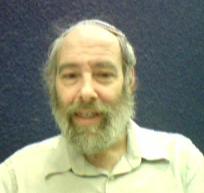

|
Associate Professor of Linguistics Head of Generative Linguistics Program Generative Linguistics branch, Department of Linguistics The Hebrew University of Jerusalem Mt. Scopus Jerusalem Israel  msyfalk@mscc.huji.ac.il
msyfalk@mscc.huji.ac.il
|
Office:
|
Welcome to my professional web site! Please also visit my family Holocaust remembrance web site, which has the Holocaust memoirs of my maternal grandmother, who passed away August 2004, and my mother.
 Research interests
Research interests
|
|
 Biographical information
Biographical information
|
 Bibliography
Bibliography |
 Courses
Courses |
If you read this page carefully, you will discover all kinds of neat things about me other than the fact that I am a linguist. You will discover, for example, that I do my word processing with Corel WordPerfect, not the word processor that most people use, and that I have written part of a WordPerfect macro that interfaces WordPerfect with the reference software Biblioscape. You will find out that I have a page devoted to legendary Broadway composer Richard Rodgers. You will see that each course of mine has a web page with syllabus, messages to students, and downloadable versions of handouts (PDF format). (Click on the "Courses" link above for a list of my courses, with click-ons for the individual web pages.) You will also learn where I was born, what my current research interests are, and maybe even the meaning of the graphics on this page. Near the bottom of this page is a photo of my alter ego. As a special bonus, if you click here you may find some nifty tips to make linguistics wordprocessing more productive, with ideas on fonts, drawing trees and feature structures, and so on. You can also click your way to the Instructor's Guide for Lexical-Functional Grammar: An Introduction to Parallel Constraint-Based Syntax. (Some of this is useful for students too)
Click here to find out who boldly went where no linguist had gone before.
Oh, I almost forgot... Everything on this page will be on the exam.
|
|
 |
Languages! Languages! Languages! English, Hebrew, Greek, Hungarian, Spanish, Norwegian, French, German,
Portuguese, Russian, Arabic, Yiddish, Ladino,
Tagalog, Warlpiri, Acehnese, Dyirbal, Hindi-Urdu, Japanese,
Yidiny, Quechua, Icelandic, Chicheŵa, Samoan, Kinyarwanda,
Choctaw-Chickasaw, Welsh, Mandarin, Marathi, Malayalam, Farsi,
Inuit, Turkish, Kannada, Wambaya, Tongan, ... Over 6000
of them! And I have never met a language I didn't like.
My primary area of research interest is theoretical (generative) syntax with a typological orientation. I work within the theoretical framework of Lexical-Functional Grammar. I believe that LFG is a typologically more realistic model of language than Government/Binding theory or Minimalism, and thus more likely to represent the nature of the human language faculty. I have written an LFG textbook for CSLI Publications.
My current research is focusing on finishing work on "Long-distance dependency constructions in a non-transformational constraint-based theoretical framework", which was funded 2007-2011 by the Israel Science Foundation.
More broadly, I am interested in the nature of the basic elements of syntactic representation -- constituent structure and grammatical functions -- and the relation between them. In this context, I have written a book on subjecthood which has been published by Cambridge University Press, and I develop LFG analyses for various constructions in both English and Hebrew (auxiliaries, mixed categories, infinitives, etc.). I have also recently supervised an MA thesis by Ilona Spector which motivates an analysis of floating quantifiers in Hebrew.
I am a member of:
 |
 |
"Multiple-Gap Constructions." in Miriam Butt and Tracy Holloway King, eds., Proceedings of LFG11. On-line: CSLI Publications. 194-214.
"An Unmediated Analysis of Relative Clauses." in Miriam Butt and Tracy Holloway King, eds., Proceedings of LFG10. On-line: CSLI Publications. 207–27. A version that does not use the LFG formalism is available here.
"Accessibility to Relativization: A Reassessment." unpublished, 2009
download.

"Islands: A Mixed Analysis". in Miriam Butt and Tracy Holloway King, eds., Proceedings of the LFG 09 Conference. On-line: CSLI Publications. pp. 261-281. 2009.
"Functional Relations in the English Auxiliary System". Linguistics 46: 861-889. 2008.
"Do We Wanna (or Hafta) Have Empty Categories?" in Miriam Butt and Tracy Holloway King, eds., Proceedings of the LFG 07 Conference. On-line: CSLI Publications. pp. 184-197. 2007.
"Constituent Structure and Grammatical Functions in the Hebrew Nominal Phrase". in Jane Grimshaw, Joan Maling, Chris Manning, Jane Simpson and Annie Zaenen, eds. Architectures, Rules and Preferences, CSLI Publications. 2007.
"On the Representation of Case and Agreement". in Miriam Butt and Tracy Holloway King, eds., Proceedings of the LFG 06 Conference, Universität Konstanz. On-line: CSLI Publications. pp. 184-201. 2006.
Subjects and Universal Grammar: An Explanatory Theory. 2006. Cambridge University Press.
"Open Argument Functions". in Miriam Butt and Tracy Holloway King, eds., Proceedings of the LFG 05 Conference, University of Bergen. On-line: CSLI Publications. pp. 136-153. 2005.
"The Hebrew Present-Tense Copula as a Mixed Category". in Miriam Butt and Tracy Holloway King, eds., Proceedings of the LFG 04 Conference, University of Canterbury. On-line: CSLI Publications. pp. 226-246. 2004.
"Resumptive Pronouns in LFG" in Miriam Butt and Tracy Holloway King, eds., Proceedings of the LFG 02 Conference, National Technical University of Athens. On-line: CSLI Publications. pp. 154-173. 2002.
Lexical-Functional Grammar: An Introduction to Parallel Constraint-Based Syntax. Stanford, Calif.: CSLI Publications. 2001. [the link is to information about the book and the Instructor's Guide]
"Constituent Structure and Grammatical Functions in the Hebrew Action Nominal." in Miriam Butt and Tracy Holloway King, eds., Proceedings of the LFG 01 Conference, University of Hong Kong, Hong Kong. On-line: CSLI Publications. pp. 83-103. 2001.
"Pivots and the Theory of Grammatical Functions." in Miriam Butt and Tracy Holloway King, eds., Proceedings of the LFG 00 Conference, The University of California, Berkeley. On-line: CSLI Publications. pp. 122-138. 2000.
"The English Auxiliary System: A Lexical-Functional Analysis." Language 60: 483-509. 1984.
"Subjects and Long-Distance Dependencies." Linguistic Analysis 12: 245-270. 1983.
"Constituency, Word Order, and Phrase Structure Rules." Linguistic Analysis 11: 331-360. 1983.
 |
 |
Click on highlighted course name to go the web site for the course. Teaching schedule is after the course information.
36602. Phonology
Basic concepts in phonology: phonemes and underlying representation,
phonological rules, distinctive features, autosegmental representation, and syllable structure.
Examples will be drawn from a variety of languages.
[Generative Linguistics Program obligatory 1st year course]
36607. Morphology
The course examines the primary concepts and issues in morphological theory and analysis:
morphemes and allomorphy, inflection and derivation, morpheme-based vs. word-based approaches
to morphology, paradigms, and the interaction between morphology and other components of
the grammar.
Textbook: Haspelmath, Understanding Morphology
[Generative Linguistics Program: obligatory 2nd year course]
|
36616. Syntactic Typology |
36606. Lexical-Functional Grammar |
36825. Multifunctionality in Syntax: Wh-type Constructions [graduate course 2011-2]
In wh-type constructions, a single element bears multiple grammatical functions.
This multifunctionality is usually modeled formally as movement from the canonical position of
one function to the canonical postion of the other function. In this course we will explore the
properties of these construcions through a direct representation of multifunctionality,
without movement. We will explore islands, pied-piping, the existence of empty categories,
in-situ questions, externally- and internally-headed relative clauses, eccessibility' parasitic gps, and more.
36804. Subjects: Typology and Theory [graduate course 2008-9]
We will examine typological issues relating to the grammatical function "subject"
and develop a theory of subjecthood within a general theory of grammatical functions. Among the
topics to be discussed: the subject as the expression of an argument, the relational hierarchy,
subjects and anaphora, subjects in multi-clausal constructions, syntactic ergativity, and
the universality of the subject
36820. Grammatical Functions [graduate course 2010-11; also 2005-6]
"Grammatical functions" are notions like "subject" and "object".
This course will examine the role of grammatical functions in syntactic description
and their place in linguistic theory through the investigation of a wide range of
constructions (passive, raising, control, wh constructions,
predication, etc.).
44948. Wh Movement Without Movement [graduate course 2007-8]
It is often thought that wh constructions are evidence
that syntactic theory must allow displacement (movement). In this course, we will
examine the properties of these constructions in a theoretical framework without
the device of movement.
44951. Structure and Function in Syntax [graduate course 2006-7; also 2004-5]
This course will examine the nature of constituent
structure and the relationship between constituent structure and grammatical functions
in light of current research.
 |
I was born in New York City on 14 November 1958. On my father's side, I am descended from Levites who served in the Holy Temple in Jerusalem. On my mother's side, I am descended from secret Jews from Spain (the family's story has been told in novelized form in The Family y Aguilar by Marcus Lehmann) and my mother herself is a survivor of the Holocaust. (I was named for my mother's father Jenö Klein, who was murdered in the Holocaust. Click here for my mother's and grandmother's memoirs of the Holocaust.)
I grew up in Lynbrook, Long Island, with my brother Mike and my sister Marsha. During my high school years, I learned languages as a hobby. My teachers at Lynbrook High School and my guidance counselor Dr. John A. Beyrer encouraged this interest of mine, and by the time I graduated I already had some vague awareness of phonetics and historical linguistics (particularly Romance historical linguistics). As a freshman at Brandeis University, I took Introduction to Linguistics with Ray Jackendoff, and I was hooked. I graduated Brandeis with a B.A. in Linguistics in 1980, and went on to do graduate work at MIT, where I learned LFG from Joan Bresnan. I got my Ph.D. from MIT in 1984.
A month after getting my PhD, I returned to the land of my ancestors, Israel. Since the fall of 1984, I have been teaching linguistics at the Hebrew University (in the English Department until the end of the 2007-8 academic year, now in the Generative Linguistics branch of the Linguistics Department). I have been the B.A. advisor for Generative (previously English) Linguistics since 1994. I am the department's Web site maintainer; I established the English Department site (which I no longer maintain) in January 1998, and the Generative Linguistics site in June 2008. I was on sabbatical as a Visiting Scholar in the Linguistics Department at Stanford University August 1999-February 2000.
I live in the East Talpiot neighborhood of Jerusalem with my wife Brandel (a former La Leche League Leader and author of the e-book Vegetarian Freezer Cooking), three of our sons (Elihu (30), Matityahu (25) and Gavriel (21)), and daughter Pnina (8). (We used to live in the French Hill neighborhood.) My wife's cousin Ilene died of cancer a few weeks before her 39th birthday; my wife has established a web page in her memory.
 |
 |

Space science fiction, especially ![]() (in case you coundn't tell!). Star Trek: Enterprise was notable for having a linguist as one
of its main characters: communications officer Ensign
Hoshi Sato boldly went where no linguist had gone before!
(in case you coundn't tell!). Star Trek: Enterprise was notable for having a linguist as one
of its main characters: communications officer Ensign
Hoshi Sato boldly went where no linguist had gone before!
Broadway musicals, especially c. 1940s-1960s. Click here for a page about Richard Rodgers. (A connection between Star Trek and Broadway musicals: Nichelle Nichols, who played Lt. Nyota Uhura in the original (and best) Star Trek, understudied for Diahann Carroll in the Richard Rodgers musical No Strings.)
the Movement for Masorti (Conservative) Judaism. I am a member of the Masorti synagogue Moreshet Avraham in East Talpiot. In the past, I have been a member of the Masorti synagogue Ramot Zion in French Hill (and even served on the Board of Directors) and of the Conservative synagogue Kol Emeth in Palo Alto, Calif.
The greatest wordprocessor ever invented, WordPerfect. I use Corel WordPerfect X3. WordPerfect offers superior abilities to format wordprocessing documents, including a Reveal Codes window which displays all the formatting codes; left-, center-, and right-justification on the same line; open formatting codes; the ability to handle long documents; and much more. My book Lexical-Functional Grammar: An Introduction to Parallel Constraint-Based Syntax was formatted using WordPerfect. (The one thing WordPerfect can't do is Hebrew; for Hebrew wordprocessing I use DavkaWriter, which has superior Hebrew-formatting capabilities.)
Reference and research software: Biblioscape, which is reasonably priced and includes a Notes module for research notes and lots of other features. It can be called up from within WordPerfect using macros available on the Biblioscape website. I've done some recent programming of the macros, using code inherited from previous versions.
I was a beta-tester for the Windows version of the gradebook program GRADE GUIDE. I have been using GRADE GUIDE for years, and am very happy with it. GRADE GUIDE is shareware.

And because, in all the galaxy, they had found nothing
more precious than Mind, they encouraged its dawning everywhere. They
became farmers in the fields of stars; they sowed, and sometimes they
reaped.
--Arthur C. Clarke, 2001: A Space Odyssey
This page last modified 15 January 2012